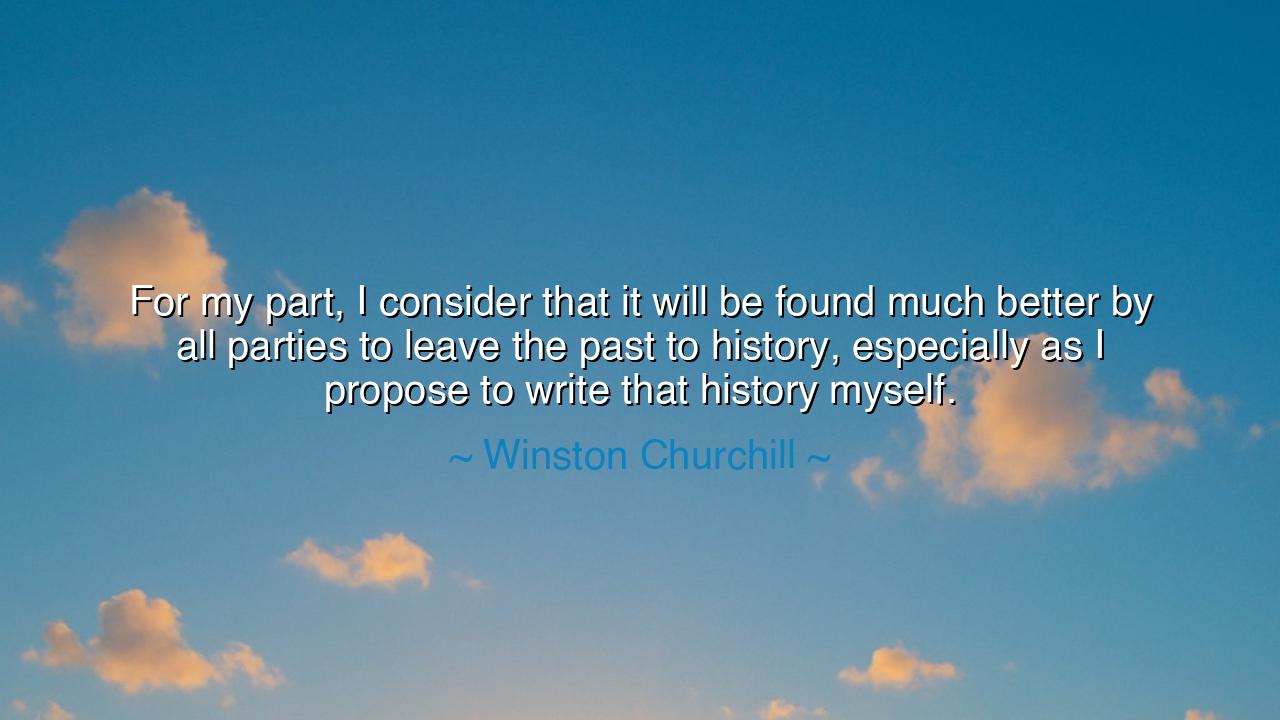
For my part, I consider that it will be found much better by all
For my part, I consider that it will be found much better by all parties to leave the past to history, especially as I propose to write that history myself.






When Winston Churchill declared, “For my part, I consider that it will be found much better by all parties to leave the past to history, especially as I propose to write that history myself,” he spoke with the quiet authority of a man who had witnessed the tumult of nations and the weight of human endeavor. These words are both a warning and a declaration: that history is not merely a record of events, but a realm of interpretation, where memory, judgment, and perspective converge. Churchill, having served on the battlefield, in the halls of government, and in the corridors of diplomacy, knew that the past is a potent force — capable of inspiring courage, but also of stirring bitterness if handled carelessly. To leave it to history is to entrust it to reflection, to discipline, and to the patient hand of narrative.
The origin of this quote lies in Churchill’s dual life as statesman and historian. A man who fought in wars and negotiated peace, he understood that the recounting of events shapes their meaning. In the aftermath of global conflict — particularly after the trials and triumphs of World War II — he recognized the necessity of leaving judgment to the measured lens of history, rather than the passions of the present. Yet Churchill’s confidence that he would “write that history myself” also reveals a deeper truth: he saw that those who experience events at the highest levels possess a unique insight, a responsibility to record with clarity, accuracy, and wisdom. History, for him, was not passive but active memory, a gift and a burden for those who witnessed it.
In these words, Churchill teaches that the past is not a weapon to wield in the present, but a lantern to illuminate the path forward. To cling to grudges or glory can distort truth, creating cycles of misunderstanding and resentment. By contrast, to entrust the past to history is to allow perspective to breathe, to let reflection temper emotion. In the life of a nation, as in the life of an individual, memory must be disciplined. The past shapes identity, but it must not imprison action; it instructs, but it must not inflame. Churchill’s wisdom is that wisdom arises not from obsession with what was, but from measured engagement with what can be learned.
Consider the story of The Peloponnesian War, recounted by Thucydides. He was both historian and participant, yet he strove to separate emotion from observation, to record events with clarity and fairness. His history did not merely glorify Athens nor demonize Sparta, but sought to preserve lessons for all time. Churchill, in his own era, followed this tradition — aware that the chronicling of World War II would be scrutinized by generations who would seek not only facts, but meaning. Like Thucydides, he understood that to tell history responsibly is to serve both the present and the future.
Churchill’s quote also carries a subtle warning about ownership of narrative. Those who live history and those who tell it often diverge in perception. Misrepresentation can inflame grievances and distort truths for political ends. By asserting his intention to write history himself, Churchill does not boast; he claims the responsibility to render events faithfully, to reconcile the chaos of experience into coherent understanding. He recognizes that the act of recording history is itself a moral endeavor — a duty to justice, clarity, and memory.
There is also humility hidden within his confidence. Churchill knew that history, once written, is larger than the self. Even the historian must submit to evidence, chronology, and principle. The past is not conquered; it is interpreted, illuminated through the care of the chronicler. In leaving the past to history, Churchill urges patience, reflection, and rigor — qualities often neglected in the heat of politics, conflict, or personal grievance. In this way, his words serve as a guide not only for statesmen, but for every soul seeking wisdom from experience: let reflection, not passion, shape understanding.
And so, O listener, let this teaching be your lantern: leave the past to history, but engage with it conscientiously. Record your experiences, seek truth in memory, and learn the lessons that time has to offer. Do not let anger or pride dictate your view, but allow clarity, fairness, and reflection to prevail. Churchill reminds us that the past is a teacher, but only if approached with patience, courage, and discipline.
In the end, history is both shield and sword, memory and guide. Churchill’s insight calls upon us to act with integrity, to trust in reasoned reflection, and to embrace the responsibility of understanding the past without being enslaved by it. For in leaving the past to history — and in shaping its telling with wisdom — we honor both truth and posterity, ensuring that the story of humanity is not only remembered, but understood.






AAdministratorAdministrator
Welcome, honored guests. Please leave a comment, we will respond soon